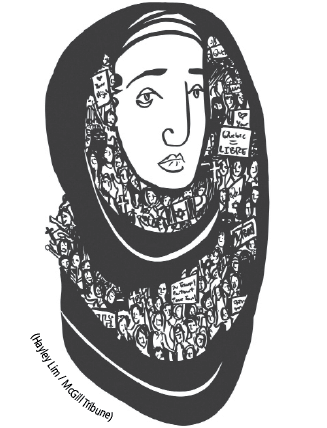When politicians attack, artists strike back. Barry Cole, president and chairman of Montreal’s Cole Foundation, is helping do just that through his Intercultural Conversations—Conversations Interculturelles program. The program gives grants to Montreal theatre companies to show the city’s diversity on their stages.
“The mission is to present onstage the stories of the various cultural communities of Montreal, so that people from a francophone or anglophone background will gain a greater appreciation for the intricacies and the subtleties of those cultures,” Cole said. For the 2014-15 season, 16 of the 27 applicants received grants totaling $250,150.
Intercultural Conversations—Conversations Interculturelles was founded six years ago in response to the recommendations of the government-sponsored Bouchard-Taylor Commission. The commision’s report called in part for greater understanding among the many communities of Quebec. Cole’s initiative sought to aid in the process through theatre. He believed that theatre could help to ease the anxieties of francophone and anglophone communities towards immigrants.
“It was a way to have the stories onstage, in a non-confrontational way, of different minority cultural groups, so that [the groups] could feel a resonance with them and change their opinions about them,” Cole explained. “With greater understanding comes greater harmony.”
Though the proposal of Bill 60—known as the Quebec Charter of Values—hasn’t changed the scope of Cole’s goals, it has intensified his desire to promote diversity in Montreal. After the initial proposition of the charter, Cole wrote a brief letter to the government outlining why he believed that Bill 60 was poor legislation. In the note, he highlighted that there was already legislation separating church and state, discussed his view that religion was a private issue rather than a public one, and emphasized the increase in diversity in Montreal theatrical productions brought about by his grants.
One recent grant recipient, the children’s theatre company Geordie Productions, is going beyond the money given by Intercultural Conversations—Conversations Interculturelles to address issues of diversity. Artistic director Dean Fleming is devoting Geordie’s entire 2014-2015 season to responding to the charter.
“Our whole season is based around differences between people, what’s the same about people, and in what ways should we be looking at what’s important,” Fleming said.

A prime example of Geordie’s attempt to tackle the issues raised by Bill 60 is the upcoming play by playwright Marcus Yousef, formerly titled Hannukwanzayulemas (the new title has yet to be announced). The play was the recipient of both a commissioning grant and a production grant from the Cole Foundation. It tells the story of a young girl who has to deal with competing religious influences as a result of her parents’ divorce. The work questions what is at the core of all religions and looks at the fundamental similarities between them.
Geordie’s upcoming slate will also look more broadly at issues of intercultural harmony. Over the 2014-2015 season, the company’s plays will address topics of racism, freedom, power, and assimilation.
“One of the main things we’re trying to discuss is how we’ve spent a couple of generations teaching children to look at others and celebrate the differences amongst everybody,” Fleming said. “The question we’re bringing up now is, ‘What does the charter do to a child who’s been taught that for so long, and is now being told the exact opposite?’”
Fleming sees Geordie as having an added responsibility to stimulate cultural dialogue because it targets young audiences. In addition to being a production company, Geordie also runs a theatre school for young children, and Fleming hopes to integrate the messages of his shows into the curriculum. His main priority is to have the audience be able to relate to his company’s productions.
“As long as we continually work to put our audience [and their stories] onstage, then I think we’re doing our job,” Fleming said.
Artistic Director Rahul Varma has similar goals for his company, Teesri Duniya Theatre. Like Geordie, Teesri Duniya was also selected for an Intercultural Conversations—Conversations Interculturelles grant. They received their funding for the production of Varma’s play State of Denial.
The play links together the experiences of the Rwandan and Armenian genocides, and examines issues of identity. By being told from a Canadian perspective, State of Denial also connects the Rwandans and Armenians with Canadians.
“Canada has become a shared space for us, where we can tell the story of all people, wherever they are from, as if they are Canadians,” Varma said. “We believe in more communities, more people, more histories, and more cultures, because to us, that’s what Canada is.”
Varma’s belief in Canadian multiculturalism made him particularly outraged when Bill 60 was initially proposed. At the time, Teesri Duniya was running the play Letters from My Grandma, which was about a young immigrant woman trying to establish her life in Canada. The diversity of the play fit in perfectly with his opposition to the charter, and Varma hasn’t stopped using his programming to protest it since then.
Varma also tries to highlight Canada’s diversity through the casting of his plays. Teesri Duniya operates under a policy of “multi-ethnic casting,” which contrasts with the “colour-blind casting” policy employed by many directors. Through Varma’s approach, a playwright’s vision of a character’s ethnicity is considered paramount in determining which actor will portray him. If a character is of a certain ethnicity, then Varma will find an actor of that ethnicity. By comparison, “colour-blind casting” allows for people of all ethnicities to play parts, which often leads to the casting of white actors in roles which could go to actors of colour.
Like Geordie, Teesri Duniya extends their mission beyond the stage. They publish a quarterly journal, alt.theatre, which discusses issues of diversity and theatre in an academic format. The company has also held dialogues for people to talk about intercultural problems in a public setting; however, Varma never loses track of the power of the stage.
“Theatre is an instrument of change, because it generates consciousness,” he said. “If you present dark issues through the prism of artistic beauty, then they get accepted by the audience much better than if you are simply reading them in the newspaper.”
Varma, like Fleming, is utterly opposed to Bill 60, and he uses his art to voice his dissent. Cole and his foundation have been helping them and many others to bring their messages to audiences. Like the artists he funds, Cole recognizes a theatre’s importance in the broader cultural context. As he has said, “Theatre has a tremendous ability to influence people’s minds by giving them the example on stage or challenging them with the issues.” Through their efforts, Cole, Fleming, and Varma are all spreading that influence across Montreal.









